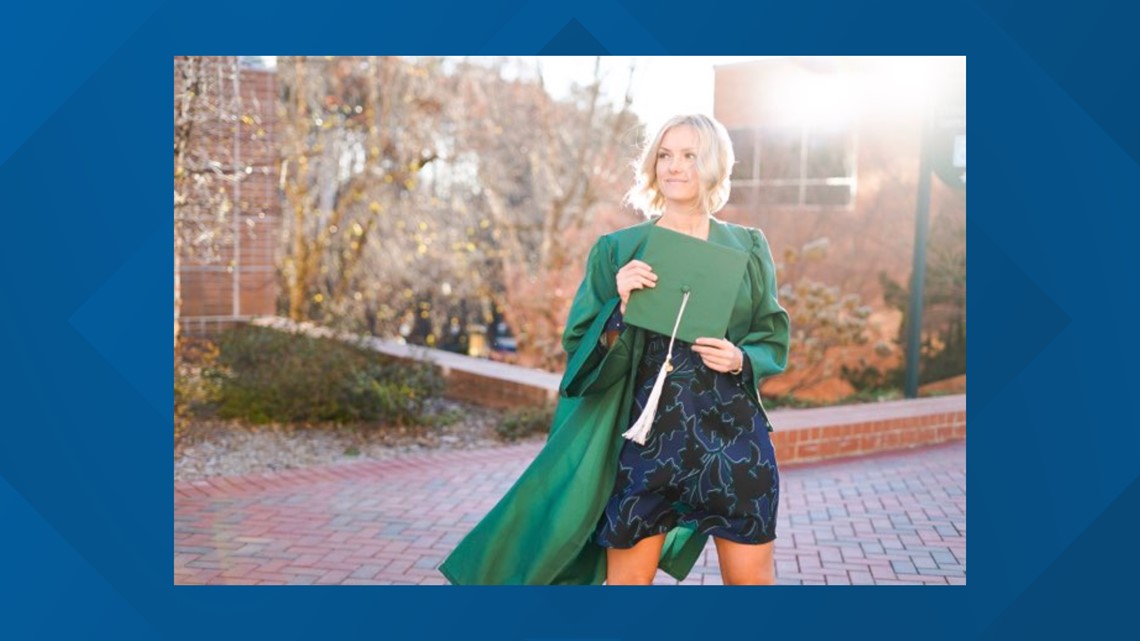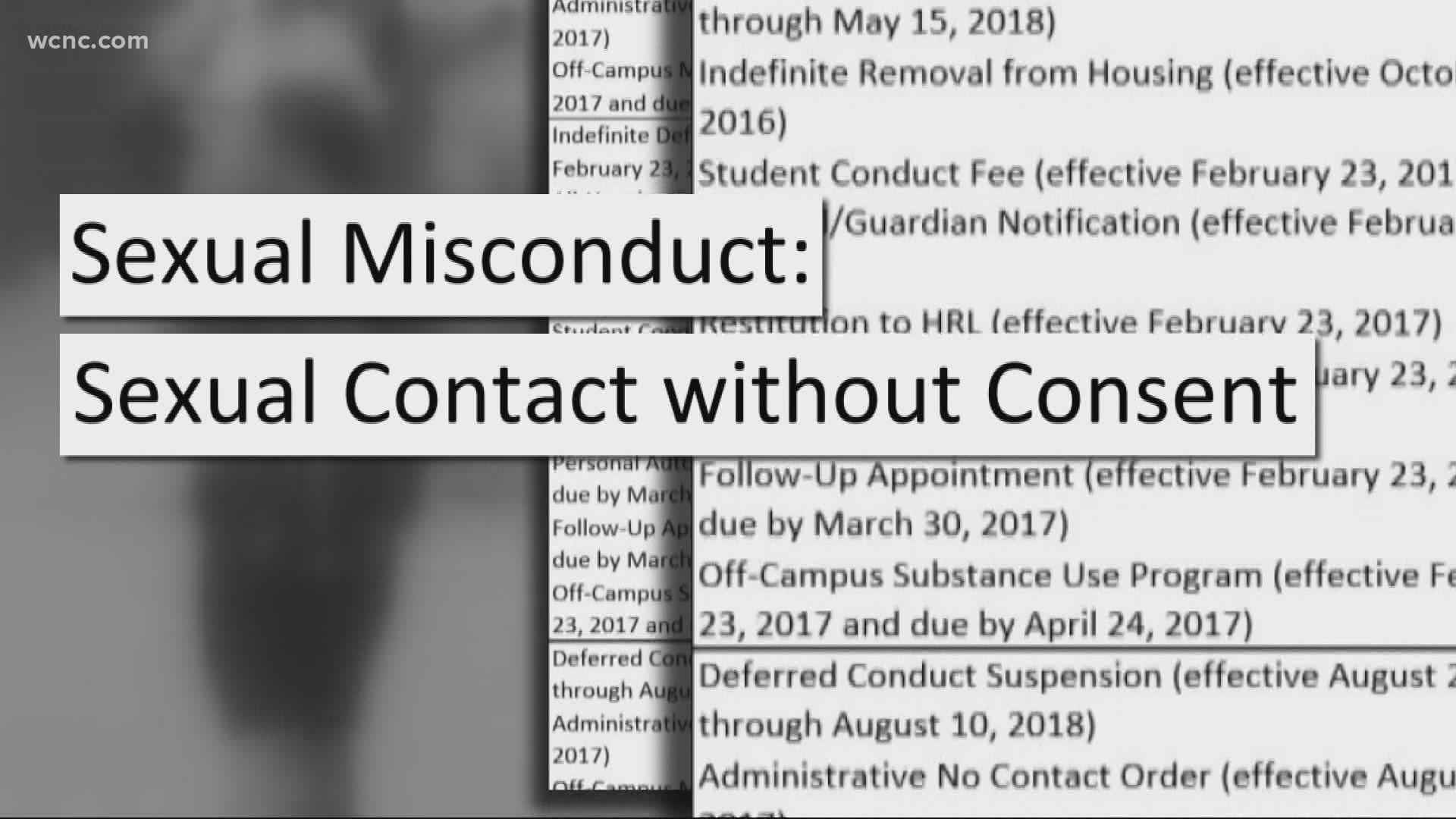Half of UNC Charlotte students accused of sexual misconduct actually disciplined
University records show UNC Charlotte has disciplined dozens of students for sexual misconduct policy violations since 2012 following campus investigations.

If a University of North Carolina at Charlotte student is investigated by the university for an alleged sexual misconduct policy violation, there's a 50-50 chance he or she will face discipline, a WCNC Defenders investigation revealed.
Of UNC Charlotte's 115 internal sexual misconduct investigations since 2012, UNC Charlotte disciplined 58 students connected to those cases, according to the university. Of those 58, campus investigations concluded the actions of merely seven of them involved criminal elements. A recent court ruling paved the way for the release of those disciplinary records, which include the names of seven men, two of which are former athletes.
THE CASE AGAINST KEVIN OLSEN
Karah Abbott said the man who violated her is on that list. In 2017, she accused her then-boyfriend, former UNC Charlotte quarterback Kevin Olsen, of rape.
"I don't think I was fully prepared for what I was going into," the UNCC graduate said from her new home of Savannah, Georgia.
While UNC Charlotte confirmed the university allowed Olsen to earn a degree, public records show UNC Charlotte expelled him effective Feb. 1, 2018, for "Sexual Misconduct: Sexual Act without Consent" following a campus investigation.
"I thought that was a good sign," Abbott said of the university's findings connected to her allegations.
At the time, Olsen chose to not participate in the campus investigation, according to his attorney, George Laughrun.
"We didn't feel like it was going to be a fair process," Laughrun explained.
Eight months after Olsen's expulsion took effect, a jury found him not guilty of the rape charges. Laughrun commended jurors for their decision.
"We never lost faith in him, and the jury did the right thing," he said outside the courthouse following the October 2018 verdict. "The weight of the world (has been) lifted off his shoulder. For a year-and-a-half, 18 months, he's lived with this over his head. Now he can get back to his life."
Abbott, meanwhile, was disappointed. However, to this day, she hopes her strength encourages others.


"I think people know something bad happened in that room past him just hitting me," she said. "People know the truth. It's not always going to go the way you want to, but I think it's still important to call out these people."
OTHER UNC CHARLOTTE INCIDENTS
University records show victims called out other students too.
Records show UNC Charlotte has suspended or expelled six other students since 2012, including a former baseball player, for sexual contact or sexual acts without consent that met criminal definitions.
Although UNC Charlotte provided WCNC Charlotte with a total of seven names, at this time, we are only naming Kevin Olsen because he’s a public figure and his criminal case received significant public attention, and Daniel Jarrahi because he pleaded guilty to a crime.
According to the university, the preponderance of the evidence in those cases showed the students didn't just violate the policy, but their acts also included criminal elements.
Despite those findings, only one student on the list also has a sexual-related criminal conviction on his record, which likely is the result of victims' reluctance to pursue criminal charges and the higher standard needed to criminally convict someone.
Records show UNC Charlotte suspended Daniel Jarrahi for a year in May 2020 for "Sexual Misconduct: Sexual Act without Consent." That decision followed a December 2019 guilty plea where prosecutors said Jarrahi pleaded guilty to felony indecent liberties with a child related to "sexual activity with an underage girl after communicating with her in a messenger app." As part of his sentence, he's required to register as a sex offender for 30 years, Mecklenburg County District Attorney's Office spokesperson Meghan McDonald said. Jarrahi's attorney declined to comment.
While the university has opened 115 student sexual misconduct investigations since 2012, a campus resource video explains formal investigations are the exception.
"Students do not have to proceed with a formal investigation to receive services and support," UNC Charlotte Title IX Coordinator Dr. Michelle Reinken said in the video. "In fact, the vast majority of students who engage with our office do not want their report formally investigated. Instead, they want to discuss the support options available to them."
During the 2019-20 academic year, for example, the university received 242 reports of sexual misconduct, with roughly 87 involving allegations of sexual misconduct against a student, according to the university. Of the 242 reports, 22 resulted in formal investigations, according to UNC Charlotte. Campus officials said many reports would not result in investigations, because the complainant chose not to move forward with an investigation and/or the alleged perpetrator wasn't specifically named or identified and/or the alleged victim did not respond to the university's repeated attempts at outreach.
According to UNC Charlotte, it's ultimately up to each victim to decide how to move forward. University officials said highly skilled and trained employees use a trauma-informed focus to empower students to decide what's best for them in that moment. Prior to a hearing, university officials can sometimes facilitate a voluntary resolution. If an investigation reaches a hearing, a trained hearing officer determines responsibility and recommends sanctions, which can then be appealed.
There are six types of sexual misconduct covered under the university's policy, including sexual act without consent, sexual contact without consent, sexual exhibitionism without consent, sexual exploitation without consent, sexual harassment and incest.
'NOT ALL OUTCOMES ARE GOING TO BE FAIR'
When students do choose formal sexual misconduct investigations, the numbers show only half result in concrete, disciplinary action, the WCNC Defenders investigation showed.
"Not all outcomes are going to be fair," Safe Alliance victim advocate manager Carmen Crape said. "I think it would be unsettling to feel that someone who has spoken up about an experience that they had and an outcome not be a discipline, but also, there are multiple sides and layers to investigating."
As an advocate, Crape knows university investigations assure the same rights to victims as they do to the accused.
"The investigation process is designed to be as neutral as possible, which at times, can make the process a little frustrating," she said. "What we assume may be kind of a cut and dry situation from our perspective has lots of layers when it comes to having it investigated."
Crape said advocates continue to support victims from start to finish.
"For me, it can be frustrating to hear those outcomes, but my role as an advocate is to really give a victim a full understanding of the process, outcomes or not," Crape said. "Hearing those outcomes may be frustrating to me, but they may be ones that the victim is saying, 'Despite that, I will have peace of mind if I come forward and go through the process, knowing that the possible outcomes may be not what I anticipate.'"
MOVING FORWARD
Karah Abbott now has that peace of mind. While she will never forget the past, she's now focused on her future. Abbott now works to help child sexual assault victims overcome trauma.
"I know what happened to me and I know that everything I said was true, and I think that makes me that more motivated to help other people," Abbott said. "You can turn this into a positive outcome."
Abbott said she felt the university treated her case fairly, and while her court case didn't go as she hoped, she still thinks she made the right choice.
"I know a lot of the kids from school probably don't even get to get as far as I did, so I'm thankful that l even had people hear me out past that," Abbott said. "Just having people hear you out and know what happened, it helps me sleep at night knowing that I still came forward. I'll never regret it, mainly just because of my family and my siblings."
UNC Charlotte officials said there are rare cases where they can contact the police directly without a victim's blessing, but only when there's an imminent risk to the entire campus. Overall, though, they said the university does not want perpetrators to be members of the campus community, adding the safety of that community is "extremely important."
UNC Charlotte's Code of Student Responsibility states when a student is expelled, he or she is permanently separated from the university and all UNC System constituent institutions. However, those expelled "may petition the Chancellor in writing for the Expulsion to be rescinded, but not earlier than two (2) calendar years from the effective date of the Expulsion." According to the university, when that type of request is considered, several factors are weighed, including what the former student has learned from the experience, what he or she has done in the years since, the extent to which the former student has taken responsibility and/or the time to reflect upon the impact his or her actions had on others, the continued participation in the campus program or activities and the general safety of the campus community. According to the university, in "many cases," the chancellor may allow the transfer of credits or fulfillment of coursework remotely.
Comparatively, earlier this year, following a court order, UNC's main campus in Chapel Hill released the names of 15 students disciplined for sexual-related policy violations since 2007.


